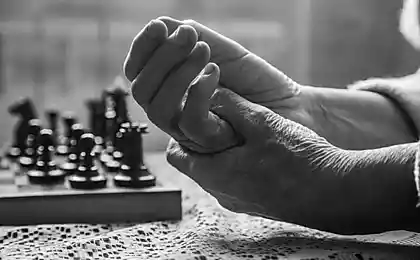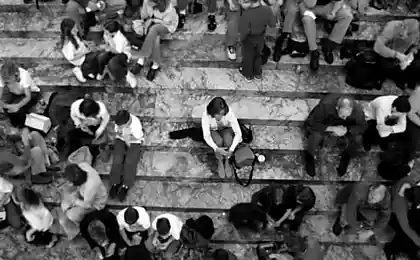Loneliness can to kill, and to elevate

summer, during a hike in the mountains of Iraqi Kurdistan, Sarah, and two of her friends at the border with Iran seized the Iraqi military. They were accused of espionage and held in solitary confinement in Evin prison in Tehran. Sarah spent almost 10,000 hours with almost no human contact before she was released. One of the most disturbing consequences of this were hallucinations.
"Peripheral vision, I began to see the flashing lights, but when turned her head, there was nothing there," - she wrote in The New York Times in 2011, the year. "At some point I heard someone screaming, and it did not stop until I felt the hand of one of the guards on his face. She tried to bring me to my senses, I realized that I cry myself ».
Loneliness and prevent a variety of everyday functions , such as sleep, attention, logical thinking. The mechanisms underlying the effects of all these, still unknown h4> From time to time we all want to be alone.
However, for most people a long social isolation ends badly. We know this not only from the stories of people like Sjoerd, experience it for yourself, but also from psychological experiments studying the effect of isolation and sensory deprivation on the human psyche. Some of these experiments even had to stop because the subjects began to behave inappropriately.
So why do so effectively destroyed the mind when we are left to themselves, and is there any way to stop it?
It is known that there is insulation from physical harm. In chronically lonely people blood pressure is higher, they are more vulnerable to infection, they have an increased risk of Alzheimer's disease and dementia. Loneliness and prevent a variety of everyday functions such as sleep, attention, logical thinking. The mechanisms that underlie all of these effects are still unknown.
However, some of the most serious consequences of loneliness perfectly visible. First of all, isolation violates our sense of time
In 1961, a geologist from France Michel Siffre spent two weeks on an expedition exploring an underground glacier in the French Alps. He stayed underground for two months, decided to learn how darkness affects the human physiology. He also decided to give up hours, and live "like an animal". And later, during the tests on the surface, his team found that it takes 5 minutes for the calculation of what he had hoped for 120 seconds.
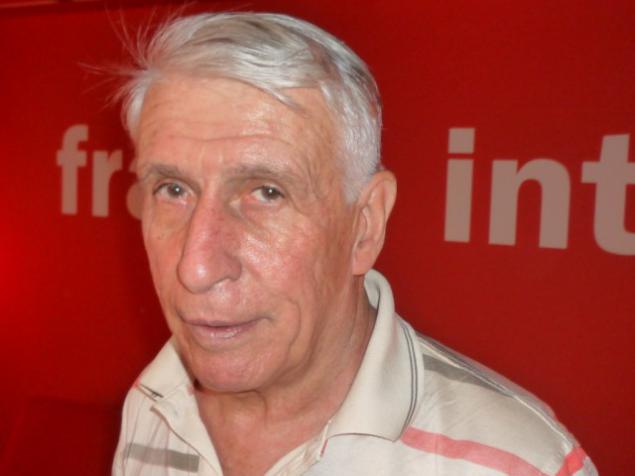
On a similar effect, "time dilation" reported and Maurizio Montalbini, sociologist and speleologist enthusiast. In 1993, the year Montalbini spent 366 days in an underground cave near Lake Pesaro, Italy. When he came out, he was convinced that it took only 219 days. His cycles of sleep and wakefulness increased almost twice. Researchers have found that most people in the dark eventually adapt to the 48-hour cycle, i.e. 36 waking hours, and 12 hours of sleep. The reasons for this are not yet clear.
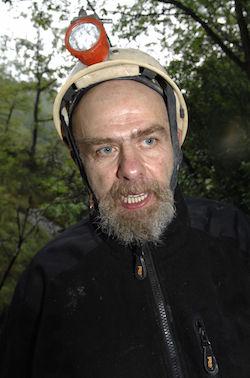
In addition to the time shifts, and Siffre Montalbini also reported and the periods of mental instability. But their experiences were nothing compared with the results of the infamous experiments on sensory deprivation, which were held in the middle of the 20th century.
In 60 years in China, according to rumors, solitary confinement was used to "brainwash" the American prisoners of war captured during the Korean War. In the US and Canada have decided to repeat the experience. Military authorities in these countries have financed a series of research programs, which today looks very questionable in terms of ethics.
The most famous experiment, which was conducted at the medical center at McGill University, in Montreal, and headed by psychologist Donald O. Hebb. The researchers invited volunteers (mainly were students), so they spent days or weeks in a special soundproof booths, without human contact. The goal was to minimize the perceptual stimulation test, to see how they will behave when almost nothing happens.
Researchers have minimized everything that subjects could hear, see and touch, wearing them on special plates, cotton gloves and a cardboard sleeve. The subjects were placed on the U-shaped cushion foam to limit noise, plus the room quietly humming air conditioners constantly to hide hushed extraneous sounds.
The subjects could not control what they see: only saw one dog, the other children saw only h4> Just a few hours later the students began to show concern.
< They have demonstrated the need for stimulation, we started to talk, sing, read poetry, trying to get rid of the monotony
But the most disturbing consequences of the experiment had hallucinations. They began with points of light, lines and shapes, and then there is a strange vision, for example, proteins, walking with bags on their shoulders. Or process points, moving down the street. The test can not control what they see, one only saw the dogs, the other children saw only.
There were audio hallucinations: Someone heard the music box, someone heard the singing of the choir. Another thought that someone touches them. One subject was thinking that he was wounded in the arm shot fired from shotguns. Others have shown that it has received an electric shock when reached for the door handle.
When the experiment was stopped, all these people have found that it is very difficult to get rid of the feeling of "altered reality". It seemed that the whole room is moving, and that the objects in the room constantly changing their shapes and sizes.
Disappointing zavershenieIssledovateli guinea going to watch for a few weeks, but the experiment had to be aborted because the test was too exhausted. Several people held out for two days. Week - did not last one.
In 2008, the psychologist Ian Robbins recreated the experiment Hebb, in cooperation with the Air Force. He isolated the six volunteers for 48 hours in soundproof booths in a former nuclear bunker. The results were similar. Volunteers showed concern became very emotional, paranoia, and observed a significant deterioration in mental functions.
In the context of a lack of information different parts of the nervous system still continue to send signals to the brain, but the signals of these no sense h4> There were hallucinations: a bunch of 5000 empty shells of oysters, snake, zebra, tiny cars, take off the room, and the mosquitoes buzzing around fighter.
So why is devoid of the perception of the brain throws such tricks?
Cognitive psychologists believe that the part of the brain that is responsible for handling the current problems (such as sensory perception), used to dealing with a huge amount of information, such as visual, auditory and other signals coming from the environment.
But with the lack of information, according to Robbins, the various parts of the nervous system still continue to send signals to the brain, but the signals they do not make sense. After a while, the brain itself is trying to make sense of these signals, and creates from They kind of pattern. As a result, the head having whole images, or portions thereof. In other words, the brain tries to construct a reality based on weak signals, which for him is still available, and the result is a fantasy world.
Marvel at these things should not be. Today, we know that even the primates do not tolerate isolation. An example might be a psychologist Harry Harlow's experiments on monkeys at the University of Wisconsin-Madison in the 60s. He deprived monkeys social contact for many months or years. According to his observations, they became "extremely anxious" in a month. A year later, they found themselves simply "erased" from society and completely lost the ability for social interaction.

It should also be noted that we have an idea about his emotional state is largely due to contacts with other people. Biologists believe that human emotions have evolved because they helped cooperation between our ancestors who lived in groups.
For example, consider the 25,000 prisoners held in US prisons today. Without social interaction, all these prisoners have no opportunity to test the feasibility of their emotions or their abstract thinking, says Terry Cooper forensic psychiatrist from the Institute Wright in California. He interviewed thousands of prisoners, and am convinced that some of them deliberately initiated violent clashes with prison staff. They do it just to prove their existence, to remember who they are.
Protective strategiyaNo social isolation does not always break a man. If there are those who are better than others struggling with it? Is it possible somehow to train yourself to deal with its consequences? Here scientists have few clear answers, but at least, we can look to the experience of people who have tried to fight against isolation.
When Sjoerd got in Iranian prisons, it is probably the least was ready for it, because the prison had fallen to her out of the blue. In her situation, the world turned upside down suddenly, and there was nothing that could help deal with that. She had to find at least some sense in their predicament, either mentally abstracted from the everyday reality that is truly monumental task if you are alone.
Hussein al-Shahristani coped with this task.
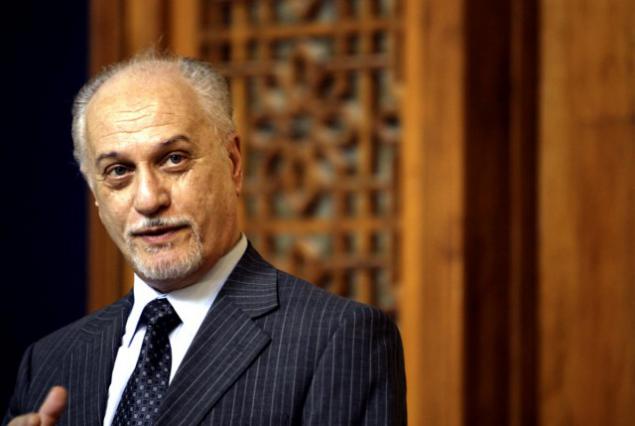
Before he was in the prison of Abu Ghraib, he was chief adviser to Saddam Hussein on nuclear energy. In prison, he was for refusing to develop nuclear weapons. He kept his sanity during the 10 years of solitary confinement, finding refuge in the world of abstractions, making math problems and solving them. Now he is deputy energy minister of Iraq.
Edith Bone, translator, follow the same strategy during the seven years that she spent in the Hungarian prison. From stale bread she has designed scores, and use them to count the number of words in its lexicon (she is fluent in six languages).
Extreme realnostPsihologi studying how people manage to cope with isolation, learned a lot from climbers and lone travelers. For adventurers who willingly abandoned the human society, the landscape itself can serve as an effective substitute for the society.
Norwegian psychologist at the University of Bergen Gro Sandal said many adventurers, trying to figure out how they cope with the extreme conditions. According to her, a constant struggle with the reality of just been the main mechanism for survival.
«It makes them feel safe. They feel not so alone ».
blockquote> A similar psychological mechanism explains why sailors shipwrecked and found himself on a deserted island, endowed with human qualities of various inanimate objects, thus creating imaginary companions, who helped them to cope with loneliness. It's more like madness, but in the sense of there.
Take, for Ellen MacArthur traveler who during his solitary world tour called his trimaran "Moby". In the course of his journey she corresponded by e-mail with your support group, and in the course of the correspondence is usually used the pronoun "we" instead of "I».

There is no better illustration of how loneliness breaks one person makes more than others, than the story of Bernard Moytessera and Donald Crowhurst, two sailors competing in sailing round the world race Sunday Times Golden Globe 1968 year.
The winner of that race became Robin Knox-Johnston, who completed her for 313 days. This man seems to have enjoyed the company of his yacht, but not as much as Moytesser, ascetic Frenchman who practiced yoga right on the deck and fed raw petrels.
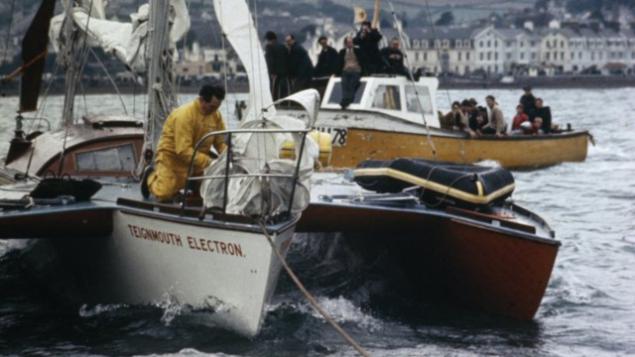
This experience seemed to him so wonderful, and the idea of returning to civilization is so unpleasant that he abandoned the race (despite good chances to win) and just continued his voyage.
«I am still on the way, because I am happy at sea. And maybe because I want to save my soul »
blockquote> A Crowhurst, in the meantime, from the very start of the race was in trouble. He came from England poorly prepared, and sends the message that he allegedly goes through the southern seas, but in fact he never left the Atlantic Ocean. Wandering aimlessly off the coast of South America for a few months, Krouhorst became depressed and suffered from loneliness. In the end he went to his cabin, summarized his imagination in a rambling philosophical treatise of 25,000 words, and then jumped overboard. His body was never found.
So what can be learned from all these stories of struggle and despair?
Obviously, we tend to seriously falter when separated from the other. Insulation is often "the sum total of misery," as the writer Thomas Carlyle.
However, perhaps more optimistic estimate: solitude can give us an opportunity to find solace outside of us, even if we are alone. We have become stronger, and the mind becomes more flexible. And we should not underestimate the power of our imagination, which can destroy the prison walls, can penetrate into the ice caves and give us imaginary companions coming next.
via factroom.ru
















